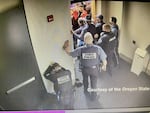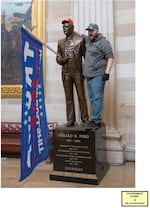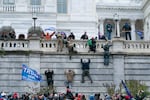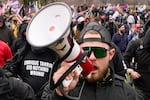Editor’s note: As President Donald Trump takes office, OPB is providing a look over the week surrounding inauguration to understand how Oregonians voted, how they’re feeling now and how the new administration could affect Northwest communities through top issues like immigration, tariffs, criminal justice and the I-5 bridge replacement.
Weeks before the Jan. 6, 2021, riots at the U.S. Capitol, Oregon saw its own version in miniature.

Surveillance video captured Dec. 21 at the Oregon State Capitol shows David Medina, 31, pushing his way into the building, which was closed due to the pandemic. Medina also engaged in confrontations with Oregon State Police at the event.
Oregon State Police
Dozens of far-right protesters burst into the state Capitol in Salem in an attempt to disrupt lawmakers’ special session over COVID-19 restrictions. Days later, some of those protesters hopped on a flight to Washington D.C. to participate in the now infamous riots that delayed certification of the 2020 presidential election.

Supporters of President Donald Trump rally at the U.S. Capitol on Jan. 6, 2021, in Washington.
Jose Luis Magana, Jose Luis Magana / AP
Now that President Donald Trump pardoned or commuted the sentences of many of the people who stormed the U.S. Capitol, critics have raised concerns that using the executive privilege in that manner would essentially co-sign anti-democratic behavior.
“Pardoning these folks is basically a tacit endorsement,” said Luke Baumgartner, a George Washington University researcher who specializes in domestic extremism. “It’s saying, ‘You know, what you did this day was acceptable. It’s OK for you to engage in political violence.’”
Time will tell whether, as Baumgartner worried, Trump’s pardons will encourage far-right activists to rally and again try to disrupt politics at local, state and federal levels.

President Donald Trump holds up an executive order commuting sentences for people convicted of Jan. 6 offenses in the Oval Office of the White House, Monday, Jan. 20, 2025, in Washington.
Evan Vucci / AP
On Monday, Trump pardoned nearly all of the 1,500-plus people charged with crimes or convicted related to Jan. 6. Prosecutors had accused them of crimes ranging from sedition to felony assaults to misdemeanor charges that amounted to little more than trespassing.
The riots injured roughly 140 officers and caused more than $2.8 million in property damage, according to the U.S. Department of Justice.
Pardons had elicited mixed reactions nationwide leading up to Trump’s stroke of the pen. Conservatives, like Vice President J.D. Vance, had recently pondered whether people accused of violence would be pardoned. Critics, meanwhile, say the pardons will undermine the federal judiciary and rule of law.
Even among defendants, there is no consensus. Some are ready to go back into the political fray, while others have come to regret their involvement.
Earlier this month, one of the men who demonstrated at the Oregon Capitol and later flew to Washington D.C., wrote on social media that he was preparing to go “on offense.”
“They tried to destroy me, shame me, and make me go away,” wrote David Anthony Medina, a Sherwood, Oregon, man. His online post featured a photo of him at the U.S. Capitol Rotunda waving an American flag.

The FBI arrested Richard Harris in south Florida this month in connection with the Jan. 6 insurrection at the U.S. Capitol.
via the U.S. Department of Justice
Medina faced felony and misdemeanor charges, according to the justice department. Notably, footage from the event captured Medina appearing to smash a wooden “Speaker of the House” sign belonging to U.S. Rep. Nancy Pelosi at the U.S. Capitol.
He is one of the few charged Northwest residents who has not been fully prosecuted four years later. Other Oregon men, including at least two others who stood beside Medina at the Oregon Capitol attack, have already been convicted for Jan. 6. An Oregon lawmaker who opened the door to the Capitol in Salem also faced sanctions.
Related: Former Rep. Mike Nearman pleads guilty to official misconduct in Oregon Capitol incursion
Medina did not respond to requests for comment. His online post said that Trump’s second inauguration would “free” him of “this psychological prison.”
“It’s my turn to go on offense,” he wrote. “Accountability will come.”

FILE - In this Jan. 6, 2021, file photo, violent insurrectionists loyal to President Donald Trump scale the west wall of the the U.S. Capitol in Washington.
Jose Luis Magana, Jose Luis Magana / AP
Some feel contrition
Medina’s views contrast with Scott Ray Christensen, a real estate agent from Puyallup, Washington, who said he has felt humiliated for participating in the Jan. 6 riots. He called it a “nightmare” he frequently relives, even when talking with people who thank him for participating.
“It’s not who I am and what I built my name up to be,” Christensen said. “I didn’t do anything to advance our country. A patriot is somebody who goes to war and gives their life — my great-grandfather in World War I, that’s a patriot. But a guy in the wrong place at the wrong time? I didn’t do anything.”
Christensen said he welcomed a pardon to end his parole. He and his wife — they were both convicted of a misdemeanor for demonstrating in a public building — had to ask for permission whenever they left King County.
“It feels surreal,” he said. But he still felt like there was a “black cloud” over his head. “I’m never going to gamble on ever putting myself into a situation like that again.”
Christensen said he supported pardons for people who didn’t act violently. When asked if he supported pardons for those people, he said anybody should be held accountable, regardless of party, for damaging property or hurting law enforcement.
“In my opinion, if you hit a police officer that’s doing his job, that’s not OK. And those consequences deserve to be played out,” Christensen said.
Federal prosecutors said the Christensens entered the Capitol building around 2:43 p.m. “with a large group of rioters who had congregated on the stairs and the landing outside the East Rotunda Door.” The couple “paraded around” the rotunda and took cellphone pictures before leaving. They left the Capitol grounds completely at 5:04 p.m., according to court documents.
While the couple had to pay more than a $1,000 in fines and do community service, other defendants are still feeling the sting of prison sentences.
Dennis George Adams, Jr., of Enumclaw, Washington, said he had already served his 45 days in prison for entering and remaining in a restricted government building, also a misdemeanor.
“It ain’t worth the 45 days,” he said when asked to recall the event.
Federal prosecutors said Adams entered the Capitol even as he saw rioters pushing past officers and yelling things like “It is your Capitol! Take it!” He entered the building that afternoon, was pushed out by police, and then re-entered 10 minutes later through a broken window.
Adams continues to support Trump but said he is trying to stay away from politics so he can focus on his career in residential construction.
Like Christensen, Adams said a pardon would lift the burden of having to ask permission whenever he travels across county lines, which he does regularly for work.
“I’m in a good spot where I’m at,” he said. “Whatever happens, happens. I’m working, I’m staying busy.”
A larger message
While Christensen and Adams appear to be shrinking away from political activism, they are just two of the roughly 50 people from Oregon, Washington or Idaho who participated in Jan. 6, according to a database maintained by NPR.
Among them are individuals who faced far more serious criminal convictions related to Jan. 6. Ethan Nordean, of Auburn, Washington, was sentenced to 18 years in prison for seditious conspiracy.

FILE - Proud Boy member Ethan Nordean walks toward the U.S. Capitol in Washington, in support of President Donald Trump on Jan. 6, 2021.
Carolyn Kaster / AP
Prior to Jan. 6, Nordean became well known in the Pacific Northwest for participating in political street violence with the Proud Boys in cities with liberal reputations, like Portland. He was convicted alongside four other Proud Boys, including group leaders Joe Biggs and Enrique Tarrio, who had also previously marched in Portland.
Trump commuted the sentenced for all three men on Monday and ordered them released.
While the Pacific Northwest became fertile ground for groups bent on political violence during the first Trump administration, those groups may have splintered after Jan. 6. Still, Baumgartner said, they and other groups still persist in the region.
“That’s one thing to keep in mind if there’s some sort of blanket pardon,” Baumgartner said. “Those people are let back out into society and we need to keep that in mind.”
Even if presidential pardons revive political street violence during a second administration, Baumgartner added that change wouldn’t be unique to the Pacific Northwest. It could happen anywhere in the country.
To see all of OPB’s ongoing coverage of regional politics and the latest national updates, visit our Politics page.





